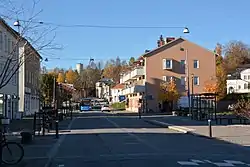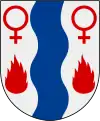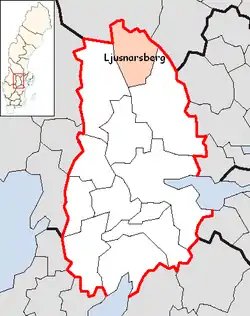Ljusnarsberg Municipality
Ljusnarsberg Municipality (Ljusnarsbergs kommun) is a municipality in Örebro County in central Sweden. Its seat is located in the town of Kopparberg.
Ljusnarsberg Municipality
Ljusnarsbergs kommun | |
|---|---|
 | |
 Coat of arms | |
 | |
| Country | Sweden |
| County | Örebro County |
| Seat | Kopparberg |
| Area | |
| • Total | 631.08 km2 (243.66 sq mi) |
| • Land | 575.54 km2 (222.22 sq mi) |
| • Water | 55.54 km2 (21.44 sq mi) |
| Area as of 1 January 2014. | |
| Population (31 December 2019)[2] | |
| • Total | 4,771 |
| • Density | 7.6/km2 (20/sq mi) |
| Time zone | UTC+1 (CET) |
| • Summer (DST) | UTC+2 (CEST) |
| ISO 3166 code | SE |
| Province | Västmanland |
| Municipal code | 1864 |
| Website | www.ljusnarsberg.se |
In 1908 Kopparberg was detached from the rural municipality Ljusnarsberg to form a market town (köping). In 1962 they were reunited.
Geography
Kopparberg is located by the outlet of the Arboga River, about 80 km north of Örebro. The municipality borders the province or landskap Dalarna to the north. One of the highest points is the mountain Gillersklack which is a popular winter resort with both downhill and cross country skiing. Ljusnarsberg lies in a mountainous mid-lower-central district of Sweden named Bergslagen (Berg = mountain, lag = law).
The area has historically been a mining district.
Industry
One of the largest industries is the Kopparbergs Brewery, making beer and cider distributed both nation- and worldwide, and is arguably one of the best known brands of that kind in Sweden.
The municipality is part of a regional KNÖL-group (acronym for Kommuner i Norra Örebro Län), consisting of Ljusnarsberg Municipality, Nora Municipality, Lindesberg Municipality and Hällefors Municipality.
Localities
Town with over 50 inhabitants:
- Kopparberg, including Bångbro 3,300 (seat)
- Ställdalen 736
- Stjärnfors
- Ställberg
- Högfors
- Mossgruvan
- Hörken
- Bastkärn
- Silverhöjden
- Yxsjöberg
Twin towns
Ljusnarsberg's three twin towns with the year of its establishing:
- (1944) Lapinlahti, Finland

- (1949) Aars, Denmark

- (1949) Sunndalsøra, Norway

References
- "Statistiska centralbyrån, Kommunarealer den 1 januari 2014" (in Swedish). Statistics Sweden. 2014-01-01. Archived from the original (Microsoft Excel) on 2016-09-27. Retrieved 2014-04-18.
- "Folkmängd i riket, län och kommuner 31 december 2019" (in Swedish). Statistics Sweden. February 20, 2020. Retrieved February 20, 2020.
External links
- Ljusnarsberg Municipality - Official site